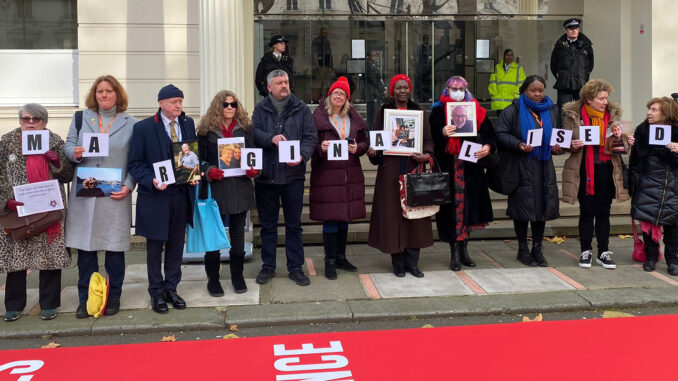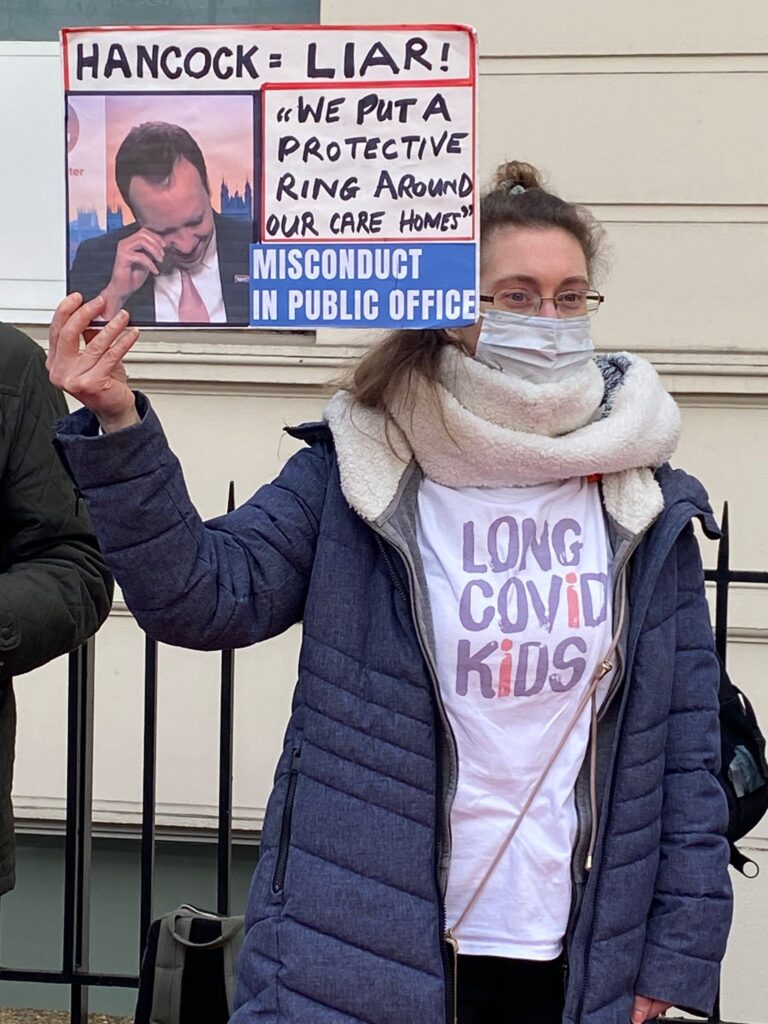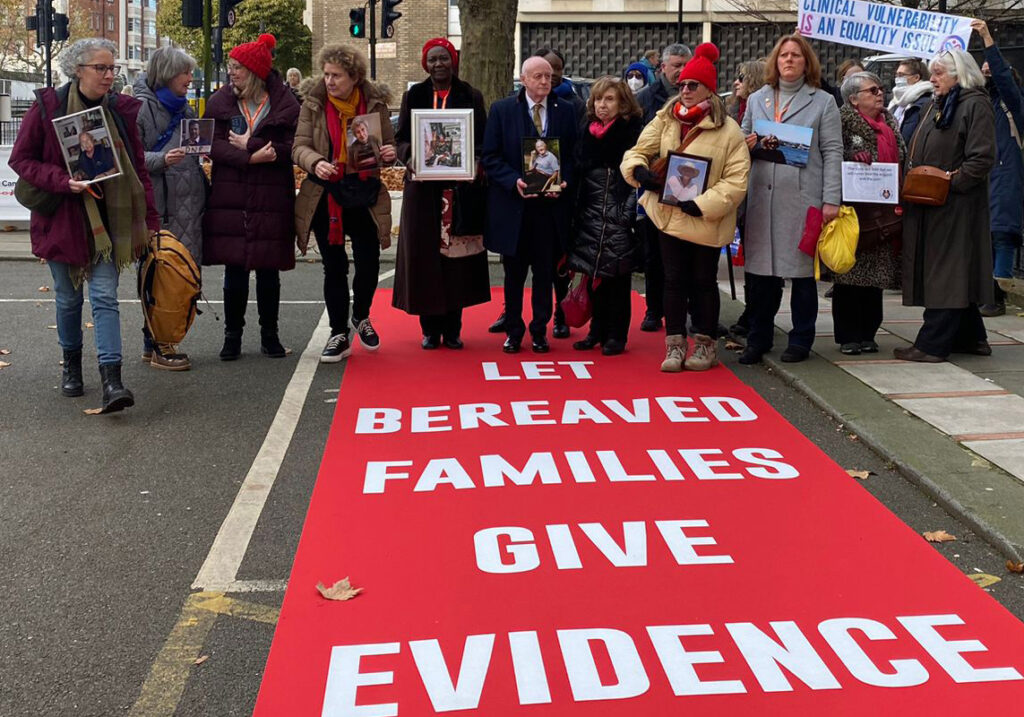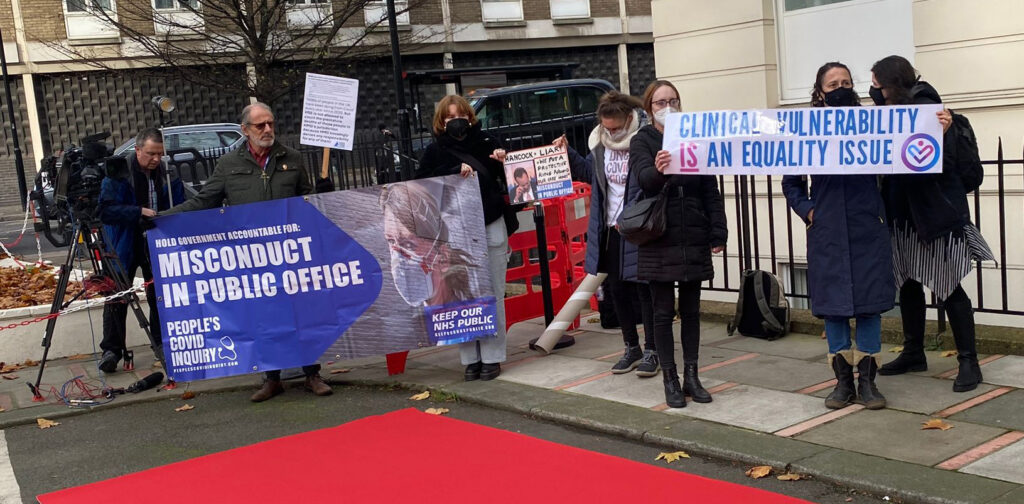
Former Health Secretary Matt Hancock has appeared over 2 days in front of the UK Covid-19 Inquiry, which is now in its third module – ‘Impact of Covid-19 pandemic on healthcare systems in the 4 nations of the UK‘. KONP members joined Covid-19 Bereaved Families for Justice UK, Clinically Vulnerable Families, Long Covid Kids and Covid Action outside the inquiry session and listened to Hancock’s evidence.
Lucy Nichols, KONP Campaigns Officer
On Thursday 21 November Hancock appeared before the inquiry and was quizzed on his handling of the pandemic, including PPE for NHS staff, the lack of hospital beds including intensive care, the suspension of elective surgery, and more. He denied that the NHS was no longer available to all during lockdown and beyond, saying ’It depends on how you define need’ – an outrageous deceit given the tens of 1000s of patients with serious delays in diagnosis and cancelled operations, cancer included. He argued that the NHS did not collapse during the pandemic, and defended the use of the slogan ‘Stay home, save lives, protect the NHS’.
The former minister was either unable or unwilling to answer these questions, continuing his career in brass-necked lies, for instance his assertion that the UK did not run out of PPE and ITU beds. (Remember his ‘We put a protective ring around our care homes’.) He deflected blame and skirted around questions, for instance on the issue of Black, Asian and ethnically diverse NHS staff being given inappropriate PPE, or what steps were taken to protect migrant healthcare workers and disabled people during the pandemic.

He was questioned on blanket ‘Do Not Resuscitate’ orders, the lack of national guidance on intensive care admissions and the expensive setting up of seven Nightingale hospitals, which he said were ‘justified’ despite the fact that there were totally insufficient staff to operate them and they were barely used: Birmingham Nightingale never saw a single patient in Wave 1 or 2 nor did it host any vaccinations.
Extraordinary and heartbreaking video evidence from Professor Kevin Fong was replayed for Hancock, recalling the intense trauma and moral injury of NHS staff running out of body bags. He appeared unmoved.
The inquiry also turned to the future, and asked Hancock for his thoughts on preparing for the next pandemic which, given his refusal to acknowledge where he and the Government went wrong, yielded answers only to puff up his own sense of importance.
He returned to the witness box on Friday 22 November, where he was questioned again on his assertion that ‘[NHS] demand never exceeded capacity in the UK as a whole.’ A representative from the charity Mind pointed out that child in-patient mental health services were unable to meet demand and that the idea that the NHS was never overwhelmed during the pandemic was wrong. Hancock, rather significantly, replied that these services were ‘under very significant pressure before the pandemic’ without a shred of irony, when he and his Government of 14 years had created that gulf between patient need and NHS resources.
As Keep Our NHS Public has long argued, the poor state of the NHS, so badly neglected by the Government in the years leading up to the pandemic, was a significant factor in the high death rates. (See How prepared was the NHS? People’s Covid Inquiry, Session 1, February 2021.)
The budget cuts in the NHS in the preceding decade left the health service at risk and unable to cope with the pressure placed on it by Covid-19 and maintain ‘business as usual’ NHS care. British Medical Association estimates that since 2009/10 there has been a £446bn cumulative underspend compared with historical funding settlements. And the Nuffield Trust reported that, in the year prior to the pandemic, ‘NHS trusts had a gap between their secure income and regular outgoings of £5 billion – a budgetary black hole equivalent in size to the NHS pay bill for an entire month.’
Government negligence killed thousands
In addition to the overall lack of preparedness ahead of the virus – which was the focus of the first module of the inquiry – wrong decisions made by the Government in 2020-21 inevitably led to far higher Covid-19 death and infection rates and tens of thousands of unnecessary deaths. (See Impact on the population section 4.3, People’s Covid Inquiry Session 4, April 2021.)
Lockdowns came in too late or were lifted too early, people were encouraged back to work despite the risks and students were encouraged to move back to universities, causing a huge spike in cases. (See How did the Government respond? PCI Session 2, March 2021)
There was not enough done to protect vulnerable groups and healthcare workers. This came as Matt Hancock had an affair, Boris Johnson hosted lock down parties, and the Government handed out PPE contracts to friends.
As a result, the UK recorded some of the highest death rates in the world during the pandemic. Daily death rates due to Covid-19 reached 1500 during the height of Wave 2 of the pandemic, which recorded its first case in the UK in March 2020. Covid-19 is still a lethal disease. As of April 2024, 232,112 people had died of Covid-19 and in the week starting 8 November 2024, 205 people died of the virus.
Hancock’s inability to answer the important questions posed to him by the inquiry is a further insult to all of us who suffered through the pandemic, but especially bereaved families, patients with Long Covid, disabled people and NHS workers.

Core participant status of Covid-19 Bereaved Families For Justice (CBFFJ) The excellent CBFFJ campaign group has been a core participant in all the modules so far. They and their legal team have made an essential contribution. However, they have been refused ‘core participant’ status in Module 8, ‘Children and Young People’ and Module 9, ‘Economic response’, denying their essential voice in those modules. They have responded in a dignified protest outside the inquiry (photo).
The People’s Covid Inquiry, organised by Keep Our NHS Public, opened in February 2021 and published our report ‘Misconduct in Public Office’ that December. It covered all aspects of the Government’s handling of the pandemic. We heard testimony from bereaved family members, experts, previous government advisors, academics, leaders of trade unions and of pensioners, and health, care and transport frontline workers.
After the People’s Covid Inquiry concluded, we reported named government ministers to the Metropolitan Police. We argued that two offences were committed: ‘corporate manslaughter’ and ‘misconduct in public office’ in particular, on the tenet that the latter appears ‘where there is wilful neglect of duty… to such a degree as to amount to an abuse of the public’s trust in the office holder’. The Met refused to investigate, passing the buck to the UK Public Inquiry which, as they well know, has no powers of prosecution.

It is clear that there is a need for accountability from the leading ministers and officials of the time. Tens of 1000s of people died avoidably and millions had their lives, their education, their futures turned upside down. There is an urgent need to learn the lessons from the UK Covid-19 Inquiry so that we are far better prepared for the next pandemic. There has to be an end to the crisis in the NHS and social care, and never again can we allow our public services to be undermined with such fatal consequences.
More information on this and future modules from the UK Covid-19 Inquiry
More information about the People’s Covid Inquiry:
Misconduct in Public Office- Full Report
Misconduct in Public Office – Executive Summary
▪︎ Preface by Michael Mansfield QC, Chair of PCI
▪︎ Preface by Professor Neena Modi, PCI Panel Member
▪︎ Introduction to ‘Misconduct in Public Office’
▪︎ Findings and recommendations
▪︎ Session 1: How prepared was the NHS?
▪︎ Session 2: How did the Government respond?
▪︎ Session 3: Did the Government adopt the right public health strategy?
▪︎ Sessions 4 and 8: Impact on the population: bereaved families, care homes and older people, palliative care, disabled people, children and young people and schools
▪︎ Session 5: Impact on frontline staff and key workers
▪︎ Session 6: Inequalities and discrimination
▪︎ Session 7: Profiteering from the public’s health
▪︎ Session 8: Governance of the pandemic
▪︎ Postscript; Events since the end of the People’s Covid Inquiry
▪︎ Appendices and references
For more on our ‘Restore the People’s NHS campaign:
▪︎ Our Vision for the People’s NHS
▪︎ 14 Factsheets
▪︎ Campaign hub – including campaign resources
Correction 26.11.24 This article has been updated to amend an error: CBFFJ has been excluded from modules 8 and 9, not the current Module 3. We apologise for this error.

Leave a Reply